Tundra Swan
(Cygnus columbianus)
Conservation • Description • Habitat • Ecology • Distribution • Taxonomy
Conservation Status |
|
|||||||
| IUCN Red List | LC - Least Concern |
|||||||
| NatureServe | N5B, N5N - Secure Breeding and Nonbreeding SNRM - Unranked Migrant |
|||||||
| Minnesota | not listed |
|||||||
Description |
||
There is usually a small yellow patch (lore) on the bill below each eye. This is not always present. When present, it may not be visible when viewed at a distance. |
||
Size |
||
48″ to 60″in length 78″ wingspan |
||
Voice |
||
Similar Species |
||
Mute Swan (Cygnus olor) is larger. The bill is orange with a black knob at the upper base. It is a rare vagrant in eastern Minnesota. Trumpeter Swan (Cygnus buccinator) is larger. The bill is black and has no yellow lores. It is much less common. |
||
Habitat |
||
Shallow areas of lakes and wetlands, agricultural fields |
||
Ecology |
||
Migration |
||
Late March to mid-May and November |
||
Nesting |
||
|
||
Food |
||
|
||
Distribution |
||||
Occurrence |
||||
Common migrant |
||||
Maps |
||||
The Minnesota Ornithologists’ Union All Seasons Species Occurrence Map |
||||
Taxonomy |
|||
| Class | Aves (Birds) | ||
Order |
Anseriformes (waterfowl) | ||
Family |
Anatidae (ducks, geese, and swans) | ||
| Subfamily | Anserinae (true geese and swans) | ||
Genus |
Cygnus (true swans) | ||
Subordinate Taxa |
|||
Bewick's Swan (Cygnus columbianus bewickii) Whistling Swan (Cygnus columbianus columbianus) |
|||
Bewick's Swan (Cygnus columbianus bewickii) is sometimes treated as a separate species, Cygnus bewickii. |
|||
Synonyms |
|||
Olor columbianus |
|||
Glossary
Lores
Small patches of skin between a bird’s eye and bill, one below each eye.
Visitor Photos |
|||||
Share your photo of this bird. |
|||||
| This button not working for you? Simply email us at info@MinnesotaSeasons.com. Attach one or more photos and, if you like, a caption. |
|||||
Dan W. Andree |
|||||
Tundra/Whistling Swans taking flight... A flock of Tundra or Whistling swans. I believe Tundra and Whistling are the same species. Anyway captured this image early in the spring of 2021 at a pond in Norman Co. Mn. I am using some 4k footage of them in a video. |
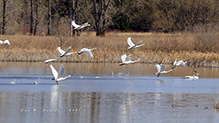 |
||||
Wayne Rasmussen |
|||||
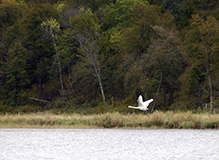 |
|||||
Swan migration at Tamarac Nat'l Wildlife Refuge - 2009 |
|||||
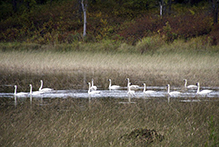 |
|||||
Ed Oliveras |
|||||
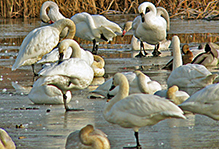 |
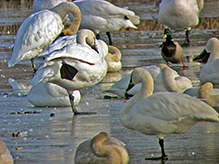 |
||||
MinnesotaSeasons.com Photos |
|||||
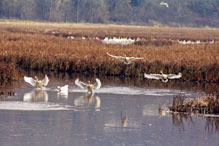 |
|||||

Slideshows |
||
| Tundra Swan Allen Chartier |
||
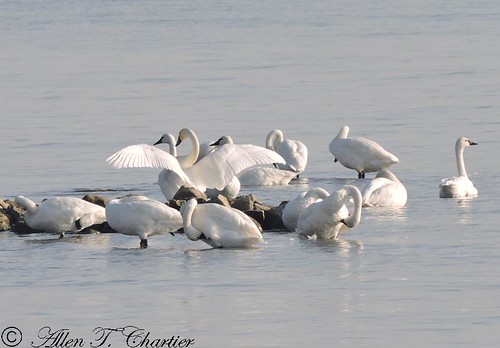
|
||
| Tundra Swan Andy Reago & Chrissy McClarren |
||
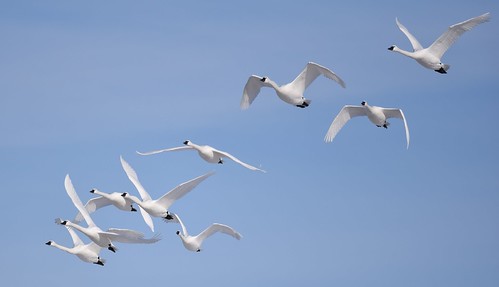
|
||
| Tundra Swan JMC Nature Photos |
||
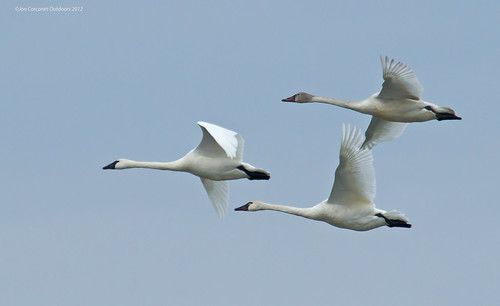
|
||
| Tundra Swans Craig A. Mullenbach |
||
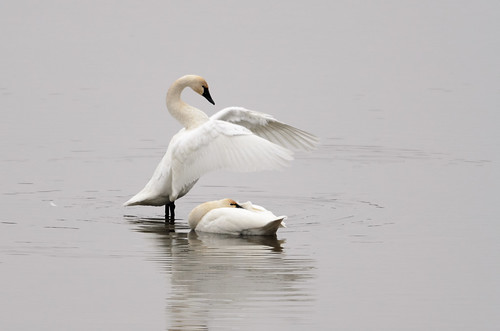
|
||

Visitor Videos |
|||
Share your video of this bird. |
|||
| This button not working for you? Simply email us at info@MinnesotaSeasons.com. Attach a video, a YouTube link, or a cloud storage link. |
|||
Other Videos |
|||
| Tundra Swan Migration pt1 exceptionals |
|||
About
Uploaded on Jan 29, 2007 Migration of the Tundra Swan on the upper Mississippi river late Autumn of 2006. |
|||
| Tundra Swans (Anatidae: Cygnus columbianus) Flying Carl Barrentine |
|||
About
Uploaded on Apr 16, 2010 Migrant Tundra Swans leave the Kellys Slough NWR, North Dakota en route to their Breeding grounds at high latitudes (16 April 2010). |
|||
| Tundra Swans at Pickering Creek Audubon Center Kelsey Frey |
|||
About
Uploaded on Dec 7, 2009 In 2002 and 2005 Pickering Creek Audubon Center (Easton, MD) restored several acres of farmland into freshwater wetland and grassland habitats for migrating waterfowl and shorebirds. Today the wetlands host black ducks, mallards, northern shovelers, green wing teals, pintails, wood ducks, american wigeons, ruddy ducks, canada geese, snow geese, tundra swans, killdeer, yellowlegs, great blue herons, many more birds, and a host of amphibians. The wetlands serve as vital wintering habitat and stopover habitat during migration. Shown are an adult and immature tundra swan preening their feathers visible from the overlook platform November 20, 2009. Canada geese are heard in the background. |
|||
| White Wing | The Tundra Swan Migration John Davidson |
|||
About
Published on Apr 25, 2013 Each year, just at the first hint of spring thaw, massive waves of tundra swans begin a migratory trek from the Chesapeake Bay area, where they winter, to the Beaufort Sea in the Arctic, where they breed and nest. These magnificent birds aren't known to most North Americans, for their fly-past across the vast land is brief. A few days to rest and replenish at various locations in Southern Ontario and Manitoba, but no more. The imperative of an ancient biological clock calls them to keep moving north. For they have a precious few weeks to breed, nest and ready their fledglings for the 4200km return flight in the fall. The video is part of a feild report on the tundra swan migration, posted at http://www.perfectdayfactory.com/tundra-swans/ |
|||
| Tundra Swans, Mississauga; Mar 17, 2013 LFazio PeregrineFalcon1918 |
|||
About
Published on Mar 18, 2013 By the hundreds Tundra Swans, harbingers of spring, arrived in north Mississauga, Ontario by mid March, 2013. In a human made water collection culvert, beside the expressway, this primitive migration pattern continues against all human obstacles. Their eerie yodeling calls was a joy to hear; the Swans are on the way to the 'tundra' biome following the atlantic flyway that they have followed for millennia. |
|||


|
Created: Last Updated: © MinnesotaSeasons.com. All rights reserved. |


